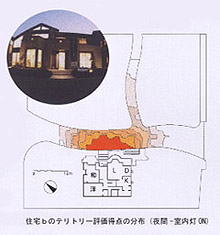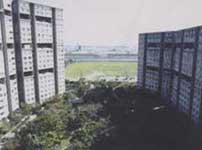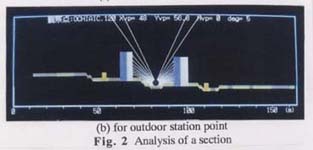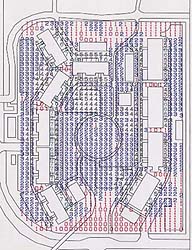|
 The Psychological Pressure of Houses over Adjacent Exterior Space The Psychological Pressure of Houses over Adjacent Exterior Space
|
|
<Journal of Architecture, Planning and Environmental Engineering, No.
529, Pp.133-139, Mar. 2000>
|
| Shigeo Kobayashi, Ryoichi Yanai, Ryuzo Ohno |
|
This research examines what physical
factors of a detached house are relevant to the strength of psychological pressure
in the neighborhood. Four houses in a house-exhibition place were selected as
experimental targets and sixteen subjects were asked to rate how much pressure
was felt at given points at daytime and nighttime. The experimental result
suggested that the psychological pressure value generally depended on the size
of apparent house profile. Therefore, the model was formulated using the solid
angle of the house facade and the sliding glass doors and main entrance. The
weights for these elements varied with each subject. In the nighttime
situation, the fitness of the model was improved when two more variables were
added, namely the amount of the illumination received at the viewpoint and the
amount of the illumination emitted by the house's windows.
|
 |
|
 Measurement and Graphic Representation of the Residents' Mutual Visual
Interactions for the Site Planning of Multi-family Housing
Measurement and Graphic Representation of the Residents' Mutual Visual
Interactions for the Site Planning of Multi-family Housing
|
|
<Proceedings of 6th ICECGDG, P.568-571, August 1994>
|
| As a tool for site planning of multi-family housings considering residents'
psychological responses, a personal computer program was developed to predict
the amount of visual interaction at a given point in a proposed environment.
A case study using this tool and questionnaire to the residents revealed
that both senses of privacy and security were related with the measures
of visual radiation from surrounding buildings and paths. The outdoor spaces
in the housing site where residents feel unsafe could be predicted by lack
of visual radiation from surrounding buildings. |
 

Distribution of level of visual radiation of a housing site
|
| Paper → EDRA1996 (text only) |
TOPへ
|